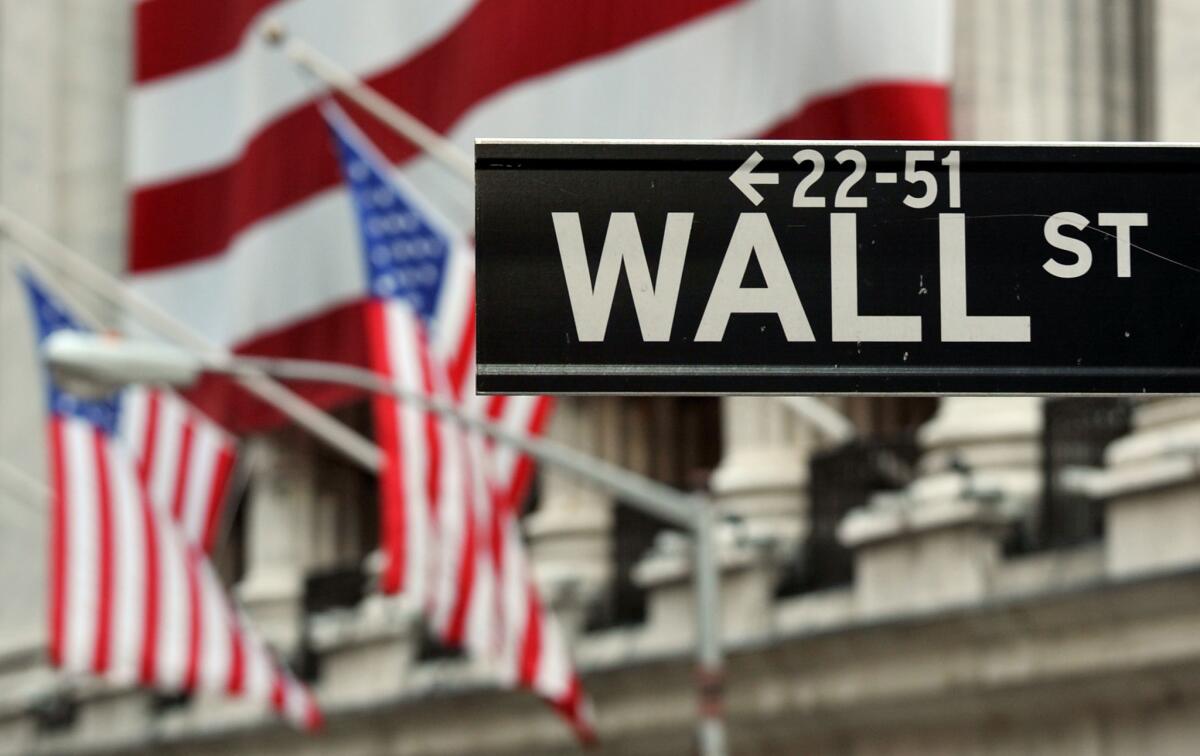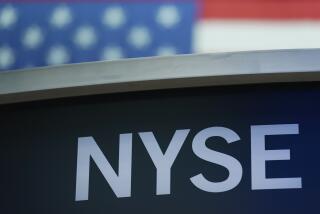Stocks fall 3% to a 3-year low as Congress stalls again on coronavirus relief

- Share via
Stocks fell a further 3% on Wall Street on Monday, to a three-year low, as Congress hit another roadblock in talks to inject nearly $2 trillion into the economy.
Even an extraordinary flood of support from the Federal Reserve wasn’t enough to arrest the fall of stocks, as frustration with Washington rises along with the number of coronavirus cases.
Another attempt to advance the aid bill on Capitol Hill failed in an afternoon vote. The plan would send checks to U.S. households and offer support for small businesses and the hard-hit travel industry, among other things, but Democrats say it too heavily favors corporations at the expense of public health and workers.
As Congress was locked in stalemate, the number of known infections worldwide jumped past 378,000. After just a few weeks, the United States has more than 43,000 cases and more than 400 deaths.
“The Fed is only important to the extent that it keeps the markets running smoothly,” said Chris Zaccarelli, chief investment officer for Independent Advisor Alliance. “It’s completely up to the federal government — and I mean Congress and the executive branch — at this point.”
With Monday’s losses, the stock market has lost more than a third of its value since its record last month, as more businesses shut down in hopes of slowing the spread of the novel coronavirus. Economists increasingly say a recession seems inevitable, analysts are slashing their forecasts for upcoming corporate profits and no one can say for sure how deep the downturn will be or how long it will last.
The S&P 500 closed down 67.52 points, or 2.9%, to 2,237.40 in another day of sudden swings. It was down as much as 4.9% and as little as 0.2% earlier in the day. Before trading opened, futures for the S&P 500 swung from a loss of 5% to a gain following the Fed’s announcement, a microcosm of the extreme volatility dominating the market in recent weeks.
The Dow Jones industrial average fell 582.05 points, or 3%, to 18,591.93. The Nasdaq lost only 18.84 points, or 0.3%, to 6,860.67 as technology stocks held up better than the rest of the market.
The yield on 10-year Treasury bonds fell six basis points, to 0.79%. Gold rose 0.7%, to $1,564 an ounce. West Texas intermediate crude oil gained 3.6%, to $24.22 a barrel.
Markets are likely to remain incredibly volatile as long as the number of new infections accelerates. Until then, investors are looking for both central banks and governments to do their parts to support the economy.
The Fed came through Monday, saying it would buy as many Treasurys and mortgage-backed securities as it takes to get lending markets working smoothly again. It goes way beyond the $700 billion in purchases announced last week, which economists called a “bazooka” of support.
It also said it will buy a wide range of investments, including corporate bonds for the first time, to improve trading in markets that help home buyers purchase houses, state and local governments borrow and businesses to get enough short-term cash to make payroll.
“This is excellent, comprehensive, covering many areas of the financial markets, their function, the flow of credit — this is exactly what was needed,” said Donald Kohn, former Fed vice chair and now senior fellow at the Brookings Institution. “The Fed has hit it out of the park, as far as I’m concerned.″
“The key issue now is getting the fiscal response straight,” said Kohn, saying that Congress needs to finance a stabilization fund to back up the Fed’s efforts.
Trading on the New York Stock Exchange went all-electronic for the first time Monday after the exchange temporarily closed its trading floor as a precaution. The exchange announced the move last week after two employees tested positive for the virus. The number of floor traders had dwindled sharply in recent years as more trading becomes electronic.
Traders said the market is operating smoothly, or as well as it could given the conditions.
“Things are sort of seamless, as far as speed and execution go,” said Peter Tuchman. He’s an often-photographed trader who usually works on the NYSE floor trading for Quattro Securities, but is now working from home.
“Surely, it runs smoother when we’re there, but these are strange times calling for strange measures, and to protect the community we have to stay home.”
More to Read
Inside the business of entertainment
The Wide Shot brings you news, analysis and insights on everything from streaming wars to production — and what it all means for the future.
You may occasionally receive promotional content from the Los Angeles Times.










